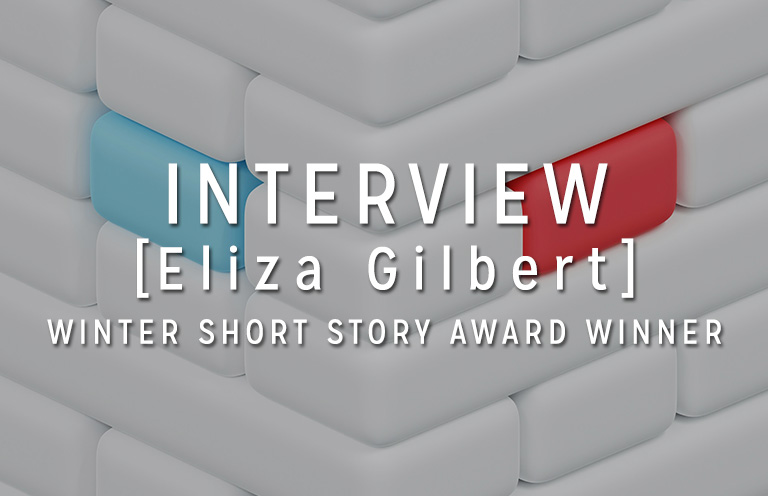Monday saw the publication of the 2023-2024 Winter Short Story Award for New Writer’s third place finalist, selected by Kelly Link: “Linoleum People” by Eliza Gilbert. Make sure to read this terrific story and then check out our interview with the winner below.

One of the things that strikes me in particular about this piece is the use of person—you begin with the collective (we), and then move between that and the 2nd person (you). You do use the fist person, but it’s interwoven, particularly with the collective. It feels very deliberate, and I think it works well, but I’m curious if this was something you curated in revision, or if it’s something that happened organically.
From the jump, this piece found itself bouncing between pluralism and singularity—that is, the “we” and the “I.” The emotional and physical landscape of the psych ward is such that there’s this constant tension between being an individual and being a part of a larger conglomerate of patients. You may be alone in an exam room with only a nurse one minute, feeling quite like you’re the last of your species, and the next, you might find yourself playing cards with six decidedly like-minded people in the group room. In earlier drafts of “Linoleum People,” I toyed with picking a perspective and sticking to it—either going with the “we,” a la Eugenides’s “The Virgin Suicides,” or really honing in on Grace as an isolated narrator. But none of these versions felt true to me, at least in the somatic sense of the word. The fluidity between the collective, the individual, and the imperative began to seem larger than a matter of characterization; it informed the spatiality of the ward, and how our patients moved through it.
Can you say something about the connection between the nose piercing, the crows, and Wheel of Fortune? I feel like they are used in this piece as touchstones of humanity for someone who has had her personhood largely stripped away, but I’d love to hear your thoughts.
Again, I think this is an issue of place. The locked psychiatric institution may as well be the ultimate exercise in minimalism. Everything is blank, cornerless; your belongings are stripped down to their most death-proof. As an occasional cynic, I sometimes believe that this approach makes the ward physically safe, but psychologically dangerous—all that linoleum really does start to hurt your eyes. As an occasional optimist, there is something quite special about falling in love with small, unremarkable things. And this, too, goes back to the ward’s unique sense of pluralism—it’s not just that all of these small, unremarkable things are important to Grace, but that, by virtue of the ward’s sparseness and close quarters, they become important to all of our characters. Everyone is sharing in these strange devotions. And it might be baffling to outsiders, but to them, it makes perfect sense.
I think one of my favorite parts of this story is the use of humor. There are a lot of sad things that happen, and, for me, the humor is both a relief and a way to highlight the sadness. Can you talk a little bit about what you see as the role of humor in your writing. And did you add more as you revised or did you consider taking some out?
Whenever I talk about my own experiences in psychiatric systems, I’m struck by the overwhelming urge to turn everything into a joke. I have mixed feelings about this urge. On one hand, treatment centers are objectively funny places. Absurd rules exist. Bizarre things happen. On the other, a lot goes on that is decidedly unfunny. People are afraid. People are held against their will. I’m always trying to delegate between these two truths, to not cheapen the unfunny stuff by only telling the funny stuff, and vice versa. I’d like to think there’s a perfect balance to be struck there, one that captures the exact ratio of fear to humor, but the truth is, the two often exist in tandem. A moment can be hilarious and horrifying. You can be scared out of your mind and laughing your ass off. So I suppose in writing the humorous parts of this story, I was thinking mostly about how the psych ward is a petri dish for paradox. Maybe that’s why they spend so much time teaching us DBT.
What’s your writing process like? Are you a morning writer? And evening writer? A whenever-you-can writer?
I’m a college student, which means I write wherever and whenever I can fit it in. A lot of the time, that’s in between classes, in my Notes app. I also somehow always manage to find time to write when I have a big assignment due the next day… Curious…
Are you working on anything else at the moment?
I’ve mostly just been working on fun tidbits in between schoolwork, both poetry and prose. The dream is to start a longer-form project sometime soon, mostly to prove to myself that I can do it.
Interviewed by Jen Dupree
